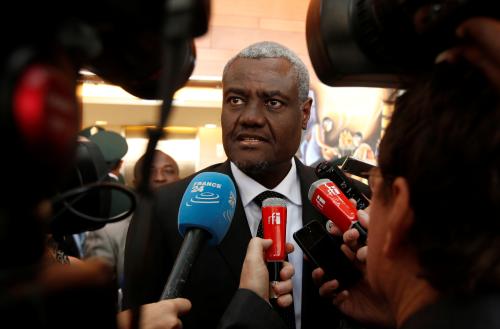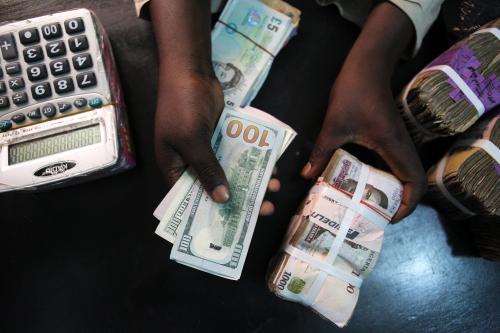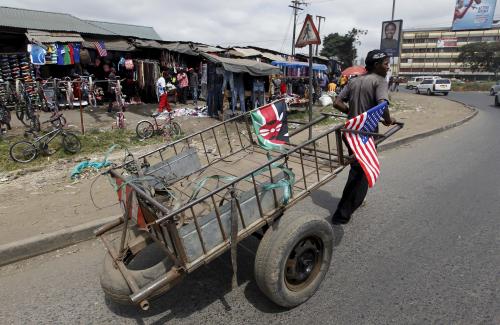Zimbabwe’s transition continues; President Uhuru Kenyatta inaugurated
Ramifications put into motion by the political upheaval that begun by the army’s detainment of President Robert Mugabe of Zimbabwe on November 15 continued this week. On Friday, November 24, former Vice President Emmerson Mnangagwa was officially sworn in as president—the first leadership transition in the country in 37 years. On Friday, December 1, Mnangagwa also announced his first cabinet officials, bringing in Major-General Sibusiso Moyo as foreign minister and bringing back Patrick Chinamasa as finance minister.
Opinions on Mugabe’s ousting and the new administration continue to be mixed: While his resignation was largely cheered, citizens still view the nonagenarian with some reverence. In fact, his birthday was declared a national holiday this week. Mnangagwa even stated, “To me personally, he remains a father, mentor, comrade-in-arms and my leader,” in his inauguration speech. In addition, as part of his resignation agreement, the former president and his wife Grace will receive a “golden handshake” from the new administration. This deal not only includes immunity from prosecution but also millions of dollars on top of being able to keep their holdings and property.
Many critics remain wary of the new president, citing fears of a replication of Mugabe’s corrupt rule. On Thursday, The Economist even stated, “If there is a chance of Mr. Mnangagwa reversing some of Mr. Mugabe’s most disastrous economic policies, few expect him to soften Zimbabwe’s brutal politics.”
However, Mnangagwa has started his tenure with an anti-corruption campaign. On Tuesday, he announced a “three-month amnesty window” in order to attract stolen and misappropriated public funds abroad back to the government’s coffers. Already Mnangagwa is seeking out some members of the Mugabe administration and supporters of Grace Mugabe on corruption charges, with former minister of finance and economic development, Ignatius Chombo, arrested on Friday and the head of the ruling ZANU-PF Youth League, Kudzanai Chipanga, detained on Monday.
In other news, on Tuesday, November 28, President Uhuru Kenyatta of Kenya was inaugurated for his second term. The controversy surrounding the 2017 elections, though, does not yet seem over. The opposition led a protest rally during the inauguration, and opposition leader Raila Odinga on Tuesday promised to hold his own inauguration on December 12. However, his coalition has since walked that language back, promising to adhere to the constitution.
CNN African migrant trade investigation causes global outrage
Last week, CNN released a report on the African migrant slave trade in Libya bringing the issue back into focus after similar reports by The Guardian in April and Reuters in May. The CNN report covers the journey migrants take to reach Libya, which has operated as a gateway to Europe, as well as how the modern slave markets operate. It attributes the uptick in the slave trade to the recent clampdown by Libya’s coast guard on migrants leaving the country: Migrants, mostly from West Africa, get stuck in the country, becoming prey to smugglers. The International Organization for Migration estimates that there are between 700,000 to 1 million migrants in Libya.
The report has elicited widespread outrage with the Libyan regime from leaders across Africa and led to public protests outside the Libyan embassy in several countries. On Wednesday, the Nigerian Senate debated the issue, calling for the federal government to raise the issue at the ongoing African Union-European Union summit. Earlier in the week, Rwanda offered to help resettle up to 30,000 refugees from Libya with the Rwandan Foreign Ministry stating, “Given Rwanda’s political philosophy and our own history, we cannot remain silent when human beings are being mistreated and auctioned off like cattle.”
The more general global response has also been swift with protests in Paris outside the Libyan embassy and a U.N. Security Council meeting on the subject. At the U.N. Security Council meeting called by France, France pushed for sanctions against human traffickers and possibly a referral of cases to the International Criminal Court for prosecution. German Chancellor Angela Merkel has “stressed the importance of ending smuggling and slavery while creating a legal route for Africans to come to Europe.” Already, during the AU-EU Summit, the U.N., the AU, and the EU created a joint taskforce to “save and protect lives of migrants and refugees along the routes and in particular inside Libya.”
African and European leaders meet at AU-EU Summit in Abidjan
This week, the fifth African Union-European Union Summit was hosted in Abidjan under the theme, “Investing in the Youth for a Sustainable Future,” with over 80 African and European countries represented. During the summit, European leaders presented the EU External Investment Plan, which encourages investment in Africa (among other regions), in the aim to promote growth and job creation, with an eye towards tackling the root causes of illegal migration. The plan will generate $52 billion in private investment to sustainable development and job creation. During the summit, host President Alassane Ouattara of Côte d’Ivoire urged young people to believe in their future and avoid putting themselves in perilous situations, as their dynamism is a key asset in building a great future for the continent.
Prior to the summit, French President Emmanuel Macron visited Burkina Faso and Ghana. During his visit, he spoke to students at the University of Ouagadougou, largely on France-Africa relations under his presidency. He stated that France will release the secret files related to Thomas Sankara’s assassination, making them available to the Burkinabé courts. Macron also addressed the present state of the CFA franc: Its peg to the euro and strong ties to the French treasury have come under significant scrutiny in recent months. He stated that he is open to any changes to the CFA franc structure as long as it is requested by West African leaders. Along those lines, Macron declared himself to be of a generation of leaders “that does not tell Africans what to do,” leaning away from the potentially paternalistic relationship that has historically existed between France and its former African colonies.
The Brookings Institution is committed to quality, independence, and impact.
We are supported by a diverse array of funders. In line with our values and policies, each Brookings publication represents the sole views of its author(s).








Commentary
Africa in the news: Zimbabwean and Kenyan politics, Libyan migrant slave trade, and the AU-EU Summit
December 1, 2017